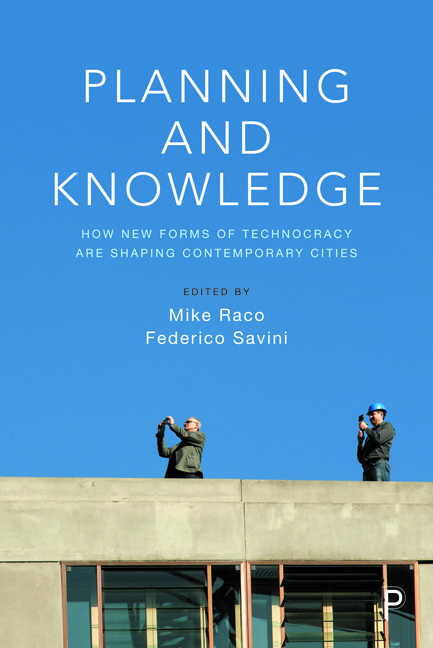Book contents
- Frontmatter
- Contents
- List of figures
- List of tables
- Notes on contributors
- Part I Conceptual framings of technocracy
- Part II Public planning and bureaucracies in contemporary urban development politics
- Part III Corporate knowledge and the land and property development sector
- Part IV Private consultants and the delivery of public policy
- Part V New constellations of actors and the management and governance of contemporary cities
- References
- Index
8 - Towards an ‘information technocracy’: discourses ofLondon’s post-referendum real estate markets
Published online by Cambridge University Press: 30 April 2022
- Frontmatter
- Contents
- List of figures
- List of tables
- Notes on contributors
- Part I Conceptual framings of technocracy
- Part II Public planning and bureaucracies in contemporary urban development politics
- Part III Corporate knowledge and the land and property development sector
- Part IV Private consultants and the delivery of public policy
- Part V New constellations of actors and the management and governance of contemporary cities
- References
- Index
Summary
Antagonistic Brexit Britain: The rise of thetechnocrats and ‘anti-expert’ rhetoric
Technocracy / tek-nok-ruh-si / noun (pl.technocracies): a social or politicalsystem in which scientific or technical expertshold a great deal of power. (Compact Oxford English Dictionary, 2006:1063)
This chapter specifically looks at the media narrativesdisseminated by real estate market agents in theaftermath of the Brexit referendum in London. Itdoes so in order to question the role of mediaexposure and private consultancy firms and reflectson the way specialist expert knowledge is publiclydisseminated to directly shape public opinion and,indirectly, real estate decision-making.
London's real estate market is considered as it is theleading destination for global capital flows intocommercial real estate in the UK, and therefore thecentrepiece of an evolving socio-technical system.Sabeel Rahman suggests that technocratic approaches‘cannot be purely neutral or objective, even whenbroader goals are set democratically by society.Technocratic institutions necessarily makejudgements in attempting to identify and pursue thecommon good’ (2011: 270). There is, of course,subjectivity in both what is considered as‘rational’ and how the common good is defined. TheUK in 2016 saw the emergence of antagonisticresponses to technocrats, as expert-informed,apparently rational, economic and political insightinto the debate surrounding European Union (EU)membership was characterised by conflicting‘anti-expert’ rhetoric. Preceding the referendum on23 June, technocrats were portrayed by anti-EUpoliticians as elitists playing on ‘team remain’,while the then Justice Secretary and leavecampaign's Michael Gove announced that people had‘had enough of experts’ (Mance, 2016). Ironically,those campaigning to leave the EU were alsosupported by their own particular technocraticevidence in pursuit of an EU exit, as diversediscourses dominated headlines.
These discourses, emerging from a spectrum of actors inrelation to the Brexit vote, adopted technicalinformation, which is interpreted in a varied andcontext specific way. In this chapter, contextspecific forms of technical thinking in the realestate market are manifest as a ‘dynamic assemblagemade up of particular actors, agencies, materials,practices and discourses that are variable in timeand space’ (Prince, 2016: 426).
- Type
- Chapter
- Information
- Planning and KnowledgeHow New Forms of Technocracy Are Shaping Contemporary Cities, pp. 103 - 114Publisher: Bristol University PressPrint publication year: 2019

